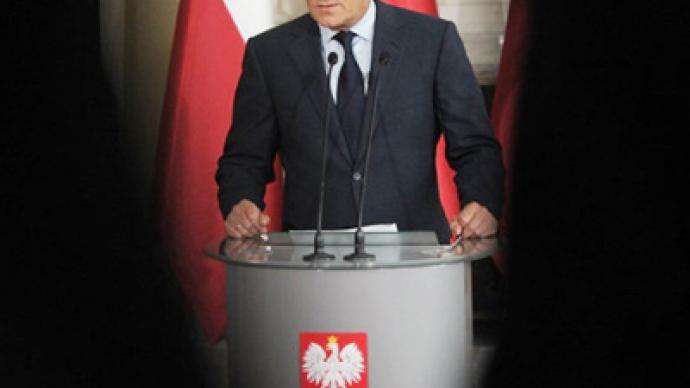Poland rejects Russia's report on fatal plane crash, evidence points to pilot error

Poland has rejected Moscow's report into the deadly plane crash that killed 96 people, including the country's president, Lech Kaczynski, last April in southwest Russia.
Aviation journalist David Kaminski-Morrow told RT that it is likely Tusk is simply struggling to accept that a Polish pilot made the fatal mistake.“I have no doubts in my mind that the Interstate Aviation Committee, which has been handling the investigation, is a professional organization. I followed several of their reports, they are detailed, they are accurate, and Russians are not afraid of issuing criticism where criticism is due, even to their own aviation industry and their own airlines, if necessary. And I’ve seen nothing that’s come out, so far, that suggests that this investigation is anything less than it’s ought to be,” he said.Prime Minister Donald Tusk criticized the findings, describing them as groundless and unacceptable.Earlier, the Polish Interior Ministry issued its comments on the Interstate Aviation Committee report to Moscow. The ministry, however,did not say whether it is satisfied with the report.Meanwhile, the twin brother of ex-president Jaroslaw Kaczynski, who heads the opposition party Law and Justice, said on Monday that he may demand the exhumation of Lech Kaczynski’s body. He suspects that some of the buried remains were not his brother’s.The theory that Russian investigators may have substituted parts of the Polish president’s body because they could not recover them all, earlier surfaced in Polish media. After it had been voiced by Jaroslaw Kaczinski, Moscow dismissed it as “nothing but fiction”.IAC, a CIS body authorized to investigate civil air accidents,will not comment on Polish Prime Minister Donald Tusk's remark regarding the IAC's report, reports Interfax."The committee does not intend to, and will not comment on,remarks by political figures concerning a technical investigation into the crash of a Tu-154M plane,board number101, belonging to the Republic of Poland," spokesman Oleg Yermolov told Interfax on Friday. "In line with the standards of ICAO Annex 13, the final report on the investigation and Poland's comments will be made public," he said.Aviation expert Chris Yates believes the Russian investigation was thorough and that it would be best for Poland to accept all conclusions regarding the accident. “I think the key issue for the Polish side is probably quite a significant matter of criticism of the Polish Air Force and, in particular, the captain of the aircraft and his co-pilot. I have looked at this issue since the accident and examined the cockpit voice-recording transcripts and I can’t fault any of the conclusions that have been linked out by the Russian authorities. I can’t fault the fairness of the investigation and I do believe that they have bent over backwards to accommodate the Polish authorities in virtually all aspects of this accident investigation,” he says. “I don’t believe, personally, that if we bring an international investigating team into the equation that the findings will be any different than what they are.”
Aviation safety expert John Cox said it is still too early to narrow down the cause of the accident.“As a pilot I recognized years ago that until you are there yourself, it is very difficult to judge the actions of another pilot,” Cox said. “I do think the investigators will be able to understand a lot of what went on on the flight deck and with a lot of the decisions, but we will need to see the evidence that they have uncovered before we can ascertain all the contributory and causal factors.”
A Tupolev Tu-154 jet carrying Kaczynski and 95 high-ranking Polish dignitaries crashed near Smolensk in western Russia on April 10. Polish President Lech Kaczynski was heading for a personal visit to the Katyn memorial site where Polish officers were murdered during World War II.Also, among the passengers aboard the doomed airplane were the last president of the anti-Communist Polish government-in-exile in London; Ryszard Kaczorowski, head of the National Security Office; Aleksander Szczyglo; presidential aide Pawel Wypych; presidential aide Mariusz Handzlik; Deputy Parliament Speaker Jerzy Szmajdzinski; Deputy Foreign Minister Andrzej Kremer; head of the Army Chief of Staff, Gen. Franciszek Gagor; head of the National Bank of Poland, Slawomir Skrzypek; and Janusz Kurtyka, head of the National Remembrance Institute.












